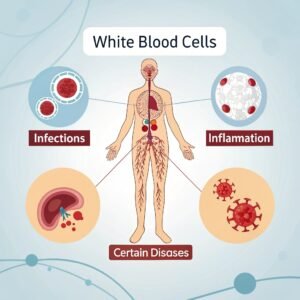How Neurotransmitters Shape Mood, Behavior, and Mental Health

Brain Chemistry: Neurotransmitters and Mental Health
Neurotransmitters, often referred to as the brain’s chemical messengers, play a crucial role in regulating mood, behavior, and mental health. These molecules facilitate communication between neurons by transmitting signals across synapses, directly influencing emotions, memory, and cognitive functions. Understanding brain chemistry: neurotransmitters and mental health is essential for unraveling how our brain operates and addressing emotional well-being effectively.
Key Neurotransmitters in Brain Chemistry
To grasp the importance of neurotransmitters, let’s examine how each one contributes to brain health:
- Serotonin: Known as the “feel-good” neurotransmitter, serotonin regulates mood, sleep, and appetite. When serotonin levels drop, depression and anxiety often follow.
- Dopamine: Dopamine drives pleasure, motivation, and reward. If its levels become imbalanced, conditions like addiction, schizophrenia, and Parkinson’s disease can develop.
- Norepinephrine: This neurotransmitter is vital for managing stress and maintaining focus. Low norepinephrine levels can lead to depression, while high levels often trigger anxiety.
- GABA (Gamma-Aminobutyric Acid): As the brain’s primary calming neurotransmitter, GABA reduces nervous system activity. When GABA levels fall, anxiety and insomnia frequently occur.
- Glutamate: Essential for memory and learning, glutamate increases neural activity. However, too much glutamate can result in neurodegenerative conditions such as Alzheimer’s and ALS.
- Acetylcholine: This neurotransmitter supports memory and learning. As acetylcholine levels decline, the risk of Alzheimer’s disease significantly rises.
Mental Health Disorders
Imbalances in neurotransmitter levels often lead to mental health disorders. For instance, low serotonin and norepinephrine levels commonly cause depression. Similarly, dopamine dysfunction is a major factor in conditions like schizophrenia and addiction. To address these issues, treatments like antidepressants and antipsychotics actively restore neurotransmitter balance, improving both symptoms and overall mental health.
By exploring brain chemistry, we can better understand how these chemical messengers influence our emotions, behavior, and cognition. Through this understanding, we can develop effective strategies to enhance mental well-being and lead healthier lives.
NOTE: IT IS ALWAYS RECOMMENDED TO CONSULT YOUR HEALTHCARE PROFESSIONAL. ALL DATA SHARED HERE ARE FOR EDUCATION PURPOSES ONLY.









